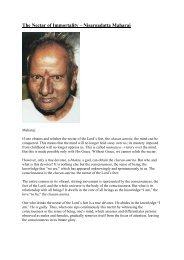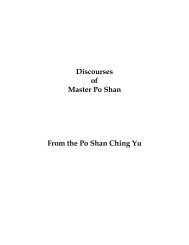Lalla-Naked-Song
Lalla lived in Kashmir in the 14th century, when many doctrinal streams were merging: Shaivism, sufism, Vedantic non-dualism, and other -isms, but Lalla is beyond religious categories, a living combination that cannot be described in those terms.
Lalla lived in Kashmir in the 14th century, when many doctrinal streams were merging: Shaivism, sufism, Vedantic non-dualism, and other -isms, but Lalla is beyond religious categories, a living combination that cannot be described in those terms.
You also want an ePaper? Increase the reach of your titles
YUMPU automatically turns print PDFs into web optimized ePapers that Google loves.
with it that the bare form of "<strong>Lalla</strong>," whom she often addresses,<br />
seemed clothing enough. Her awareness observes the body, but is<br />
not identified with it.<br />
We know very little about her, other than what comes through<br />
the poetry. There are no official references until four hundred years<br />
after her death, and no contemporary manuscripts. The legends<br />
of her life and the poems were preserved in the oral tradition.<br />
<strong>Lalla</strong> means "darling," and she is certainly beloved in Kashmir. It<br />
is said that only two words mean anything in Kashmiri, Allah and<br />
<strong>Lalla</strong>, the rest being just language. Hundreds of lines from the<br />
<strong>Lalla</strong>- Vakyana are still actively a part of Kashmiri conversation.<br />
Her diction is colloquial, tuned not to philosophy and organized<br />
religion, but to the common people. The "text" has come down<br />
with many variations, some of it in an old Kashmiri dialect, side<br />
by side with Sanskrit transcriptions. Between one hundred and<br />
two hundred songs, poems, and sayings seem to have survived.<br />
<strong>Lalla</strong>-Vakyana means <strong>Lalla</strong>'s Word.<br />
She is also known as Lal Ded, Lai Didi, and Mai Lai Diddi,<br />
all of which mean Granny Lal, Grandmother <strong>Lalla</strong>. And in Sanskrit<br />
she is called Lalleshwari, <strong>Lalla</strong> the great yogini, prophetess<br />
and practicioner of yoga. The poems reveal this double nature:<br />
one eye a warm, grandmotherly glance. The other a more severe,<br />
truth-telling vision into the Void. Her metaphors of oneness are<br />
not majestic light-upon-light images. The shapes of melting ice<br />
interest her. And she also notices how ashes merge with clay to<br />
become soil. "Study the ground, <strong>Lalla</strong>," she reminds herself.<br />
Born in Kashmir, probably in a village near Srinagar, maybe<br />
in 1320, she died near there in 1391. All these facts are speculative.<br />
There are stories of her being mistreated as a young wife living<br />
with in-laws. Her mother-in-law would put a stone on her plate<br />
and cover it thinly with rice, so that it would look like <strong>Lalla</strong> was<br />
getting more food than she actually was. <strong>Lalla</strong> never complained.<br />
And she loved to spend time meditating at the holy shrines. Sent to<br />
fetch water, she would stop there. One day her husband, thinking<br />
to punish her for dawdling on the way home, struck the jar she was<br />
carrying. It broke, but the water remained in place as a jar-shaped<br />
column on <strong>Lalla</strong>'s head. That water became the sacred "<strong>Lalla</strong>'s<br />
Lake" in Kashmir.<br />
Tradition has it that <strong>Lalla</strong> left home, and the marriage, at<br />
twenty-four to become a student of the Hindu teacher, Sed Bayu.<br />
It was then also that she began to ignore conventional standards<br />
of dress and to wander in a state of ecstatic clarity. One morning<br />
as children were making fun of her nakedness, a cloth merchant<br />
scolded their disrespect. <strong>Lalla</strong> asked him for two strands of cloth






